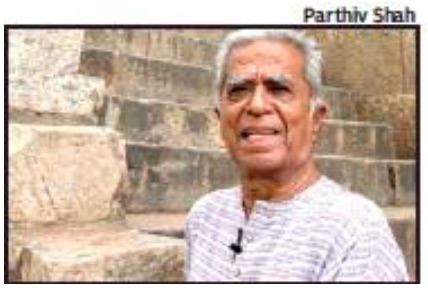Haku Shah
This is a collection of articles archived for the excellence of their content. |
A brief biography
Neelam Raaj, The man who brought art closer to craft, design, March 23, 2019: The Times of India
Ganesh Jogi was a nomadic bhajan singer who moved from drought-hit Rajasthan to Gujarat in the 1970s in search of work. By day, the young man would dig sewage pits or lay roads and at night, he would sing at hotels or fairs to boost his income. It was at one such event that artist Haku Shah spotted him, and persuaded him to start drawing as a way out of his financial hardship. Ganesh, who had never held a pen in his life, took to the brush, or rather a ballpoint pen, and began making beautifully detailed drawings of his village. Soon after his wife Teju followed, and then their sons and spouses.
But this isn’t a story about how the Jogi school of art was born but about the diminutive khadi-clad figure called Hakubhai who not only shaped institutions like the National Institute of Design in Ahmedabad, the tribal museum at Gujarat Vidyapeeth and Shilpgram, the crafts complex in Udaipur, but also helped India bridge the divide with Bharat, and brought art closer to craft and design.
In a short post commemorating Hakubhai, who passed away in Ahmedabad on Thursday at the age of 85, Laila Tyabji, chairperson at Dastkar, writes that his story encompasses the evolution of Indian contemporary craft and design. She also narrates the tale of how the man who turned the wife of a destitute mill worker into an artist by encouraging her to use patchwork was himself spotted. “Pupul Jayakar, Queen-Empress of Indian craft, had an unerring eye for talented young men. She sent Haku, just out of art college, to one of the first Weavers Service Centres, and later to be part of the formative years of NID.”
Delhi-based artist Manu Parekh, who spent time with Shah at the Weavers’ Service Centre, says his contribution to the handicraft sector such as the revival of terracotta is immense. “He was the last Gandhian practitioner in art,” he says.
Haku Shah’s son Parthiv Shah, who is a photographer, recalls that his last solo show in 2014 was titled Nitya Gandhi. “He was inspired by the daily routines that Gandhi followed such as spinning and writing.”
In an interview in 2008, Hakubhai, who grew up in a village in South Gujarat’s tribal belt, talked about the influences on his life. “When I ventured to Baroda University at the start of my career, I was drawn to three main things-—village and tribal life, and Gandhi's philosophy. These three things were part of who I was. Today I realize that they were all interconnected and have inspired me in my life and work in various ways.”
